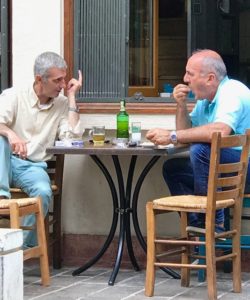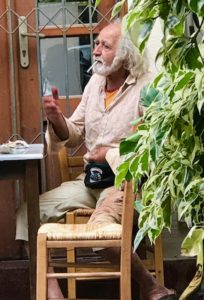Familiar Surprise
Yesterday I sat at a little table in a leafy public square nursing first a cappuccino and then two bottles of mineral water while I read a book and people watched, although not in that order, for three hours. Three hours. This is unusual behavior. In fact, the last time I did something like this was the last time I was in Chania (Crete) a year ago. It’s not that I don’t read for hours. It’s not that I don’t drink cappuccinos and mineral water. But people who hang out in public squares in my home country are often the most desperate folks who have nowhere else to go. Sanitized, “safe” public squares are commercialized and/or visibly policed. I have never been tempted to hang out in one for more than a few minutes.
In Splantzia Square, there were groups of old men talking, women with children who chased pigeons, a table of bearded, black-robed Orthodox priests involved in lively conversation, an adventurous little girl on a pink tricycle who momentarily became the center of attention, a man in rumpled linen who looked like he stepped out of a Rembrandt painting, a roving accordionist, four cats (one sleek and well fed, three lean and hungry) and perhaps the most interestingly ugly dog I’ve ever seen.
Life lived for all to see. Public life.
For me, traveling (and temporarily living) in Europe is what is known in storytelling circles as a “familiar surprise.” These countries—on this trip, Austria, Greece—make “sense” to an American. I recognize the many similarities that come from shared philosophies, religion, forms of government (not to mention the thick overlay of U.S. cultural products). Everyone wears jeans. There’s bad pop music on the radio. Same old, same old.
But threaded through, interwoven with the familiarity is the very very different way people live their lives here. There is this public life, in the squares, in the outdoor cafes (in all weather) most of us don’t live in the U.S. There is a joy in extended conversation, hours of conversation, dawdling over dinner, a long lunch with friends not a quick bite eaten at a desk, coffee enjoyed at a street-side table not drive-through coffee downed in a car. There is a distinctly unAmerican pace, reflected in the shorter work weeks, the number of sanctioned state holidays, the frequent festivals and celebrations, the above-mentioned square-sitting. (Interesting factoid: Our long work week, lack of paid holidays and meager vacation time do not add up to top place in worker productivity. All four of the European nations with higher productivity than us have MUCH shorter work weeks.)
The familiar surprise. I love it.








4 comments
I sat at the beach on Sunday for hours reading a book, watching people, the ocean … occasionally I do this at home and I only work 3 days a week and never eat my lunch at work. How can we spread this sense of living our lives vs working our lives? I think it was the Dalai Lama who wrote we own bigger houses and spend more time at work.
Cheers to you and 3 hours of being and reading, writing, watching, sipping. Thanks for sharing.
I think it’s even harder as a writer to separate life and work. I love that about what I do, and I also don’t love it.
Sometimes my husband and I will walk from our home to a local brewery, where we sit and drink and talk. To each other. All around us people are there but not there — most of them, despite good beer, good food, good weather, and presumably being with people they like or love, are on their phones. It never stops. It’s like they’re so busy taking photos of their food and drinks to post on Facebook that they can’t really taste it.
I’ve seen this too, Susan. I think what disturbs me even more are parents presumably spending “quality time” with their kids but actually spending quantity time with their smartphones.
Leave a Comment